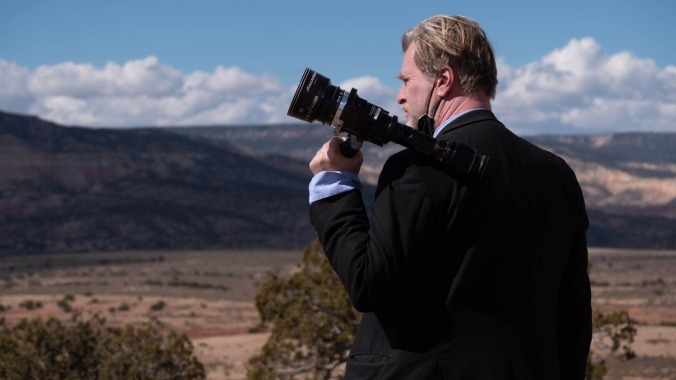Christopher Nolan is perhaps not the hero big movies deserved, but he is the one they needed. More specifically, Nolan knows—perhaps better than anyone—how to take a really huge production and make it feel intimate. Oppenheimer, a $100 million epic with an 11-mile IMAX reel about annihilation on a global scale, somehow feels as nuanced and tight as anything the director has ever done—including Memento, his first major film, which he managed to cobble together with a meager budget of only $9 million.
Oppenheimer’s Oscar-nominated screenplay was (somewhat infamously) written completely in first-person and Robert Downey Jr., one of its stars, compared the “spartan” experience on set to “100 people making a watch every day” (via Variety). Nolan even went on record recently with his love for small, tender films, telling Time magazine that two of his favorite projects in recent years were Past Lives (“subtle in a beautiful sort of way”) and Aftersun (“just a beautiful film”). Why, then, would he take on something as biblical as the bomb?
It turns out that Nolan’s drive towards largeness is actually an act of largesse. “I’m drawn to working at a large scale because I know how fragile the opportunity to marshal those resources is,” the director also told Time magazine. “I know that there are so many filmmakers out there in the world who would give their eye teeth to have the resources I put together, and I feel I have the responsibility to use them in the most productive and interesting way.”
For Nolan, part of this sense of purpose came in employing what he calls “cinema’s magical point of view”—the camera’s ability to make audiences sympathize with almost anybody—to create “the most nihilistic film I’ve ever made.” Ironically, or perhaps unsurprisingly based on the way the world is going, Oppenheimer started filming the same month Russia first invaded Ukraine: February 2022. According to atomic scientists, the doomsday clock—a measure of our proximity to global catastrophe—is still at 90 seconds to midnight; the threat of mutually assured destruction is as present as ever. The film, Nolan says, is about “the absurdity of relying on these systems or this precarious balance… it’s frightening to contemplate.”


 Keep scrolling for more great stories from A.V. Club.
Keep scrolling for more great stories from A.V. Club.